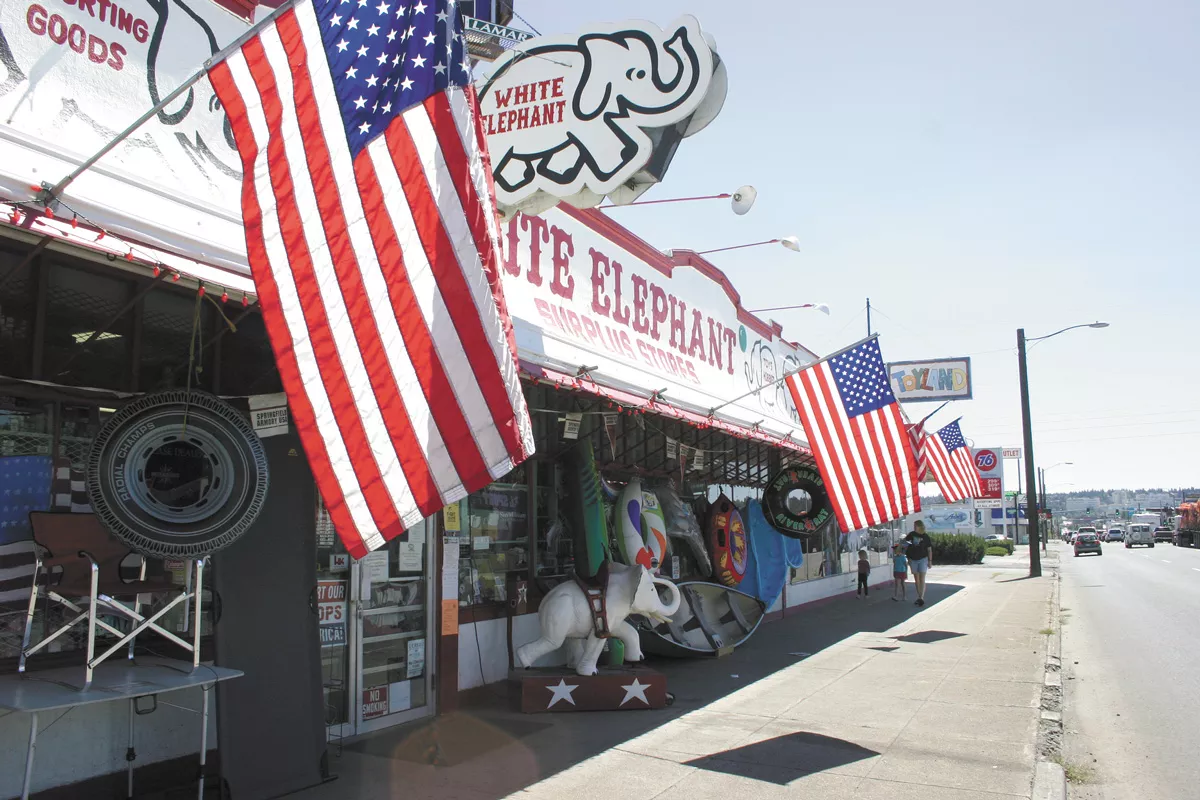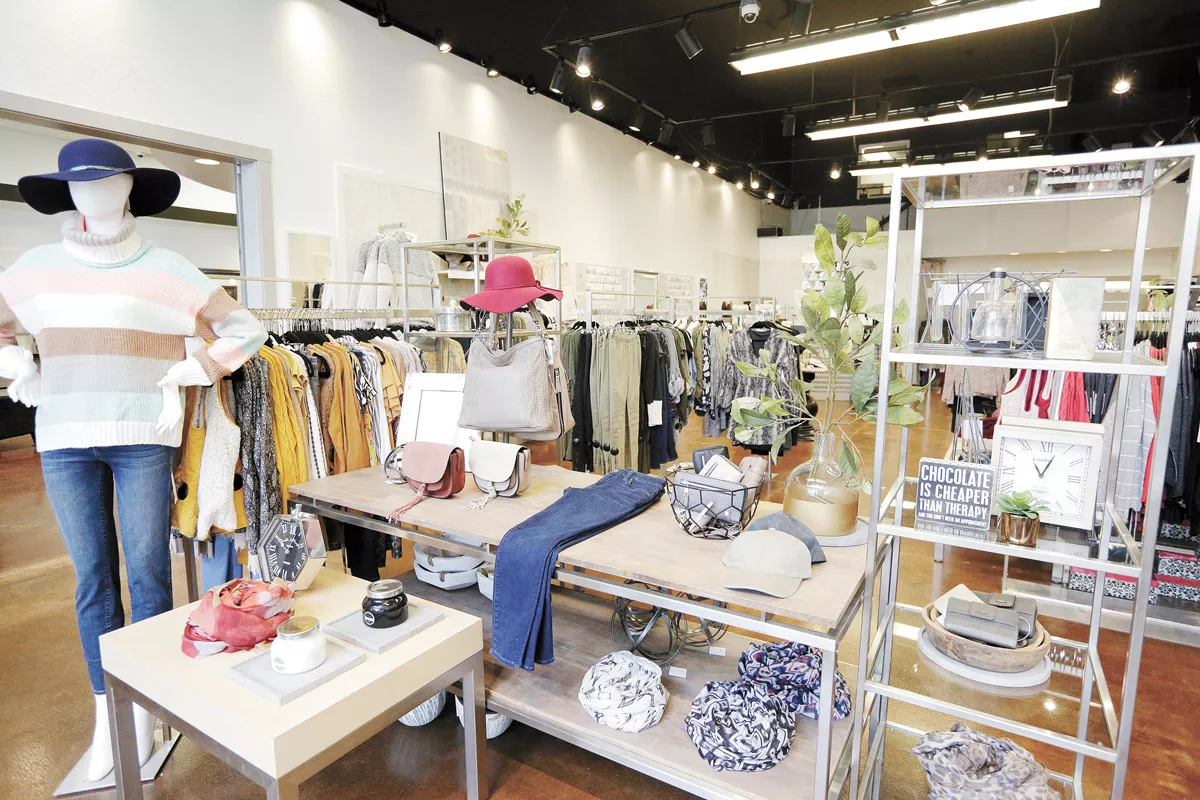When stay-home orders were issued one year ago in Washington and Idaho, forcing all nonessential businesses from retailers to restaurants to remain closed for weeks, many feared the worst: Would the region lose dozens and dozens of local businesses before the end?
In the months since, many independently owned businesses have permanently shuttered for various reasons. Some closed as a direct result of the pandemic, while owners of others saw the pandemic, paired with other factors, as an opportune time to depart. While plenty of local spots, mostly in the hospitality industry, have yet to reopen either by choice or regulation, the overall regional impact is in many ways much less dire than it could have been.
Patrick Jones is an Eastern Washington University economics professor and the executive director of EWU's Institute for Public Policy & Economic Analysis, and he says many measures of the regional economy show that Spokane County is faring notably better in economic recovery than the rest of the U.S.
That includes local retail spending, which is up in several categories (home improvement, car sales, construction) while down in others (hospitality, entertainment), Jones says.
"We really won't know the state of the world for 2020 for another three months, until July, when the fourth quarter numbers are out, but my hunch is that they were close to even with 2019," he adds.
The general health of business in the region also looks promising.
"If you look at the number of businesses in the third quarter [of 2020], it was actually higher in Spokane County than the number in the third quarter of 2019," Jones says. "From a number-of-business point of view, we didn't lose any ground as of the end of September 2020."
Despite that net gain, difficult decisions about the future were made this past year by several longtime business owners.
One local business loss widely felt by the community was the July 2020 closure of Spokane's two White Elephant stores after being operated for 74 years by the Conley family. While sales were impacted some by Washington's two-week shutdown last March, White Elephant co-owner Rich Conley says he and his siblings who ran the business founded by their father, John R. Conley, took the pandemic as an opportune time to move on.
"I guess after we were shut down for a while, it just kind of got us thinking a little different, and changing our priorities a little and paying more attention to family and being able to get together," Conley says.
"And I was thinking about retiring," he continues. "After that, [the pandemic] helped me make up my mind; it was a good time to be done."
The final weeks of White Elephant's operations were bittersweet as customers of all ages flocked to the two stores, one on North Division Street and the other in Spokane Valley, to share memories with the Conleys and their employees and to shop one last time.
"Everyone had a story about when they came in for something, or when they bought their first toy or BB gun, and riding the elephant out front," Conley recalls.
While the pandemic marked the end of an era for White Elephant, it also marked the start of a new one for another local business owner.
Tiffany Mulgrew had operated Fringe Salon & Boutique on Spokane's South Hill for more than a decade when the pandemic arrived, bringing thoughts about making a transition to something new.
"COVID played a part in our closing, but it wasn't the sole reason," Mulgrew says. "If it hadn't happened, I would 100 percent still be running Fringe, and we would have remodeled [the store]. But looking back, because COVID happened, I'm glad because my lease was up and I was able to exit on a great note."
Mulgrew closed Fringe last July to transition from retail to running a local marketing firm specializing in small business clients. Called UpSocial, the business is run by Mulgrew and one of her former Fringe employees who oversaw the boutique's social media accounts.
The many challenges of operating a business during the pandemic also served as motivation for the founding of UpSocial.
"During COVID, we all had to use the internet to find businesses and information on what they were offering, especially in order to support them," Mulgrew says. "I realized so many didn't have social media, Facebook or Instagram, or weren't posting there or didn't have websites."
Mulgrew decided then she wanted to use the expertise she'd gained as a small business owner herself, with years of experience managing her own website and marketing her business across social platforms.
"I think a lot has changed now with people finding information online because we have a new habit that's formed this last year," she says. "Small business owners can't afford to not have a website and active social media account."
Mulgrew developed UpSocial to cater to small businesses that don't have large marketing budgets.
"We're really focusing on the small businesses that need something affordable," she says. "We want them to be able to survive."
Of all industries, none have been impacted as severely as restaurants, entertainment and hospitality venues.
Just months into the pandemic, the Inland Northwest had lost several eateries and entertainment venues. One of those was the Pin, an all-ages music venue in downtown Spokane that hosted everything from metal bands to drag shows.
Other losses due directly to the myriad setbacks caused by COVID-19 include Beerocracy bar in Garland, Wolffy's diner in Logan, Garageland bar downtown, and the River Park Square location of Tomato Street. (Its North Side and Coeur d'Alene spots are still operating.)
Among the restaurant casualties last year were also several that didn't close solely because of the pandemic, like Central Food. Although owner David Blaine cited challenges of operating the restaurant during various stages of dining restrictions, his main reason was to focus on new endeavors. Nearby in Kendall Yards, chef Adam Hegsted announced at the end of 2020 that he was closing his restaurant Wandering Table, only to rebrand the space as the more casual, Mediterranean-inspired spot Baba, which opened last month.
During the same period in 2020, however, more than two dozen new restaurants opened, changed owners or expanded with additional locations across Spokane and Coeur d'Alene, according to the Inlander's tracking of the industry.
Across the border in Idaho, business closures directly tied to the pandemic were, to our knowledge, nonexistent or nearly so. Requests for data on such closures from the Idaho Secretary of State's Office, which tracks business licenses, were unanswered as of press time.
While there's plenty of ground to make up for, things are looking brighter for Washington state as a whole in 2021, says EWU economist Jones.
He says economic forecasters for the state of Washington have already revised their outlook for economic gains in 2021 a full percentage point higher than was previously predicted. Though he cautions he's not an economic forecaster, Jones says we may see up to 2 percent GDP growth for the entire state by the end of 2021.
"What does this mean for Spokane? I think the economy will grow here, and because we are actually not that different from the state of Washington in terms of retail sales," he says. "The information I am receiving says there should be quite a bit of pent-up demand. People are going to start spending, and they'll spend on services they didn't spend much on in 2020, and that includes restaurants." ♦
Washington Loses Nearly a Quarter Million Jobs in 2020
In March, April and May 2020, Washington saw at least a temporary loss of 421,500 part-time or full-time jobs as the unemployment rate jumped as high as 16.3 percent in April due to mandated closures of nearly all in-person services and activities, and as some employers reduced hours for their workforce.
Over the next several months, jobs started to slowly come back, according to unemployment statistics, and as of January 2021 the unemployment rate was about 6.1 percent.
But by November, with COVID spiking in communities across the country, there was another strict shutdown in Washington, and the state lost more jobs in December before again seeing some growth in January 2021.
The state Employment Security Department reports that from January 2020 to January 2021, Washington state lost about 234,000 jobs, with three sectors hit the hardest. Leisure and hospitality by far had the greatest loss at 112,700 jobs, followed by government employment, which was down 48,400 jobs, and manufacturing, which lost 32,100 jobs.
Idaho certainly saw some job losses last April as well (about 78,500 fewer jobs than reported in March, according to Current Employment Statistics survey data), but overall the state appears to have gained some jobs. The state reported a gain of 8,300 jobs over the last year compared to January 2020.
Idaho saw far fewer strict shutdowns of major portions of its economy than its neighbor, which may have contributed to those numbers. Interestingly, the state's Department of Labor reports that the four Idaho industries hardest hit by pandemic losses were "information (-13.8 percent), other services (-6.3 percent), leisure and hospitality (-1.7 percent), and education and health services (-1.2 percent)." (SAMANTHA WOHLFEIL)
"though" - Google News
March 25, 2021 at 03:30PM
https://ift.tt/3vZFLXh
Though the Spokane area lost many businesses to COVID-19, the economy is already bouncing back - Pacific Northwest Inlander
"though" - Google News
https://ift.tt/2FnFft4
https://ift.tt/3dmAmQf
Bagikan Berita Ini



















0 Response to "Though the Spokane area lost many businesses to COVID-19, the economy is already bouncing back - Pacific Northwest Inlander"
Post a Comment